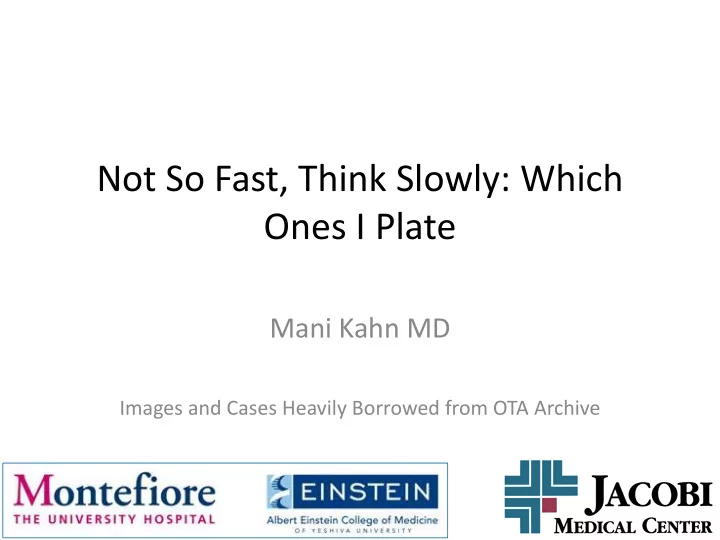

Not So Fast, Think Slowly: Which Ones I Plate Mani Kahn MD Images and Cases Heavily Borrowed from OTA Archive
No Disclosures
Mechanism of Injury • High energy pilon fractures – Significant axial force with translational/shear/rotational forces. – Rapid rate of force application – Articular and/or metaphyseal comminution. – Large amount of energy released – Significant soft tissue injury
Pilon Fixation • Fixation options are determined by fracture pattern, patient factors, and condition of soft tissue. – Plate – Intramedullary nail – Thin wire/hybrid external fixator – Primary fusion
Determining a Treatment Strategy ≠
Not So Fast Immediate ORIF…. • Frequent wound healing issues, deep infection rates up to 55% Kellam 1992
Think Slowly… • Patient Factors • Soft Tissues • Staged Treatment • Articular Assessment • Metaphyseal Assessment
Patient Factors • The best predictors of clinical outcomes were patient demographic factors—socioeconomic status, sex, level of education, and workers’ compensation status • Marsh et al 2003 • Diabetes • PVD
Soft Tissue Assessment 1. Assess NV Status 2. Determine Compartment Syndrome Risk 3. Assess swelling/blistering/skin tenting
Define the Injury- Fracture Pattern Varus Valgus Axial Load Understand Fracture Energy, Bone Quality, Primary Displacement
Staged Treatment • External fixation +/- ORIF fibula for high energy pilon fxs • Allow recovery of soft tissue injury • Delayed ORIF of plafond injury
Define Articular injury after Distraction Goal: 1. Define Reduction & Fixation Strategy Mandate: 1. Anatomic Reduction 2. Absolute Stability
Articular Assessment • Anterior • Posterior • Medial • Anterolateral • Posterolateral • Die-punch
Articular Assessment Coronal Sagittal • Older patients • Younger Patients • Low energy injuries • High energy • Valgus • Varus
Define Metaphyseal Fracture Pattern Complex Relative Stability Simple Absolute Stability
Define Metaphyseal Fracture Pattern Goal: 1. Plan Reduction Strategy(direct vs indirect) ? 2. Neutralization vs. Bridge plate for metaphyseal fracture component Complex Relative Stability Simple Absolute Stability
Begging for a plate…. • Anatomic articular reconstruction • Plate resistance of initial fracture displacement vector – Varus deformity medial buttress – Valgus deformity lateral buttress – Anterior/posterior talar escape anterior/posterior buttress
Define Mechanics of Instability Goal: 1. Understand Forces You Must Resist
Precontoured Locking Plates • Osteoporotic bone • Extensive metaphyseal comminution • Small articular fragments
Precontoured Locking Plates • Posterior, • Anterolateral • Medial • Simplify treatment in complex pilon fractures by use of single approaches
34 yo female s/p MVC with closed 43C fx
34 yo female s/p MVC with closed 43C fx • c
Minimally Invasive Plating • Use of small incisions to restore mechanical axes • Decrease iatrogenic tissue injury • Preserve fracture hematoma • Lower SF-36 & excellent AOFAS scores in 83% of patients in high energy Pilon fractures with long term followup
Special Circumstances: Open Pilon with Bone Loss • Gardner et al reported on 10 pts with 43 C open pilons with segmental bone loss treated with a standard protocol – I&D and external fixation Gardner et. al JOT 2008 – Delayed definitive ORIF, antibiotic beads in bone defect. – Staged bone grafting at ~ 12 wks. If normal infxn labs.
References • Marsh JL, Weigel DP, Dirschl DR: Tibial plafond fractures: How do these ankles function over time? J Bone Joint Surg Am 2003;85(2):287-295. • Kellam & Waddell J Trauma, 1979, Dillin et al J Trauma 1986, Ovadia et al JBJS Am 1986, McFerran et al JOT 1992, Teeny and Wiss CORR 1993 • Borrelli J Jr, Ellis E: Pilon fractures: Assessment and treatment. Orthop Clin North Am 2002;33(1):231-245, x. • Anglen JO: Early outcome of hybrid external fixation for fracture of the distal tibia. J Orthop Trauma 1999;13(2):92- 97. • • Sirkin M, Sanders R, DiPasquale T, Herscovici D Jr: A staged protocol for soft tissue management in the treatment of complex pilon fractures. J Orthop Trauma 1999;13(2):78-84. • Patterson MJ, Cole JD: Two-staged delayed open reduction and internal fixation of severe pilon fractures. J Ortho Trauma 1999;13(2):85-91. • Tornetta P III, Gorup J: Axial computed tomography of pilon fractures. Clin Orthop Relat Res 1996;(323):273-276. • Topliss CJ, Jackson M, Atkins RM: Anatomy of pilon fractures of the distal tibia. J Bone Joint Surg Br 2005;87(5): 692-697. • • Mast J, Jakob R, Ganz R: Planning and Reduction Technique in Fracture Surgery. New York, NY, Springer- Verlag, 1989. • Rüedi T, Allgöwer M: Fractures of the lower end of the tibia into the ankle joint. Injury 1969;1:92-99. • Wyrsch B, McFerran MA, McAndrew M, et al: Operative treatment of fractures of the tibial plafond: A
Recommend
More recommend